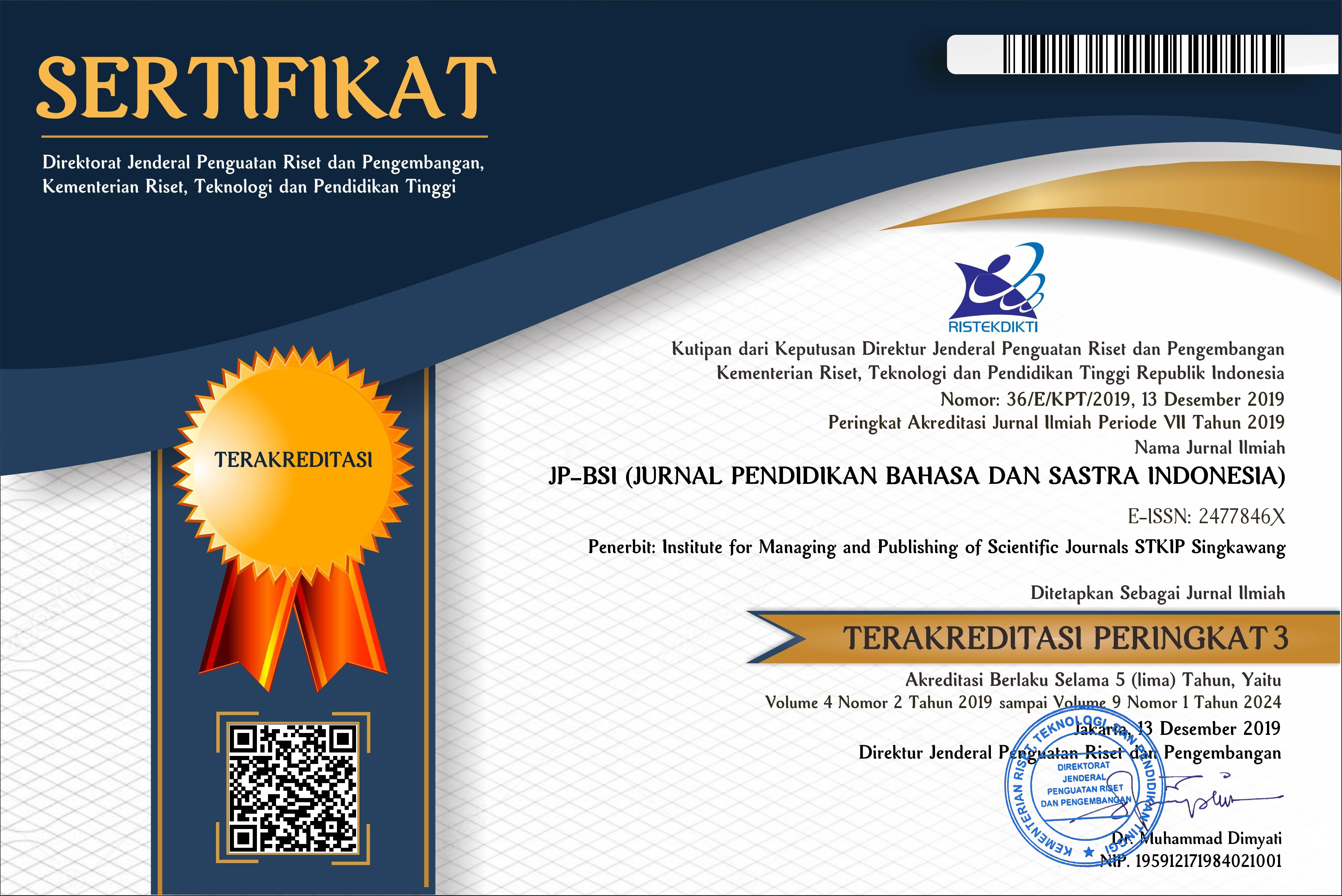Pembelajaran Teks Puisi dengan Menggunakan Media Permainan Edukasi Role Playing Game (RPG) di SMA
Abstract
Keywords
Full Text:
PDFReferences
Dixon, P., & Bortolussi, M. (2011). The scientific study of literature: What can, has, and should be done. Scientific Study of Literature, 1(1), 59–71. https://doi.org/10.1075/ssol.1.1.06dix
Dixon, P., & Bortolussi, M. (2016). Measuring literary experience. Scientific Study of Literature, 5(2), 178–182. https://doi.org/10.1075/ssol.5.2.03dix
Engelstad, Audun. 2018. Playing the procedur’’s Game: Adaptation and the Question of Fidelity. Adaptation. doi:10.1093/adaptation/apx023
Goudie, Sean X. 2017. Racial Capitalism and American Literary Studies in Web of Life. American Literary History. doi:10.1093/alh/ajx024
Haagsman, Marjolein E., et.al. 2020. Pop-up questions within Educational videos: Effect on students’ learning. Journal of Science Educational and Technology. https://doi.org/10.1007/s10956-020-09847-3
Hafid, A. 2011. Sumber dan Media Pembelajaran. Sulesana Vol 6 No. 2
Heinert, J. & Nancy L. Chick. 2017 Reacting in Literary Studies : Crossing the threshold form quality to meaning. Art & Humanities in Hagher Education. DOI: 10.1177/1474022216652766
Ikonne Ugochi H. 2016. The Teaching of Literature : Approach and Methode. International Journal of Education and Evaluation ISSN 2489-0073 Vol. 2 No. 5. www.iiardpub.org
Jacobs, A. M. (2016). The scientific study of literary experience. Scientific Study of Literature, 5(2), 139–170. https://doi.org/10.1075/ssol.5.2.01jac
Kuiken, D. (2016). The implicit erasure of “literary experience” in empirical studies of literature. Scientific Study of Literature, 5(2), 171–177. https://doi.org/10.1075/ssol.5.2.02kui
Lindell, Inggrid. 2020. Embracing the risk of teaching literature. Educational Theory.
Ludewig, Julia. 2017. A look over the wall : Using the graphic novel Druben! To Teach linguistic, literary. Cultural, and visual skill. AATG.
Magulod Jr. Gilbert Cabilangan M. 2018.Innovative Learning Tasks in Enhancing the Literary Appreciation Skills of Students.SAGE Open October-December 2018: 1–11
McCarthy, K. S. & Susan R. Goldman. 2017. Cosntructing interpretive inferebces about literary text : The role of domain specific knowledge. Elevier. https://doi.org/10.1016/j.learninstruc.2017.12.004
Meloche, A., et.al. 2020. Critical Literacy as a Lens for Stident’s Evaluation of Sources in an AP Word History Class. The Social Studies. Routledge. https://doi.org/10.1080/00377996.2020.1727828
Miall, D. S. (2011). Science in the perspective of literariness. Scientific Study of Literature, 1(1), 7–14. https://doi.org/10.1075/ssol.1.1.01mia
Ming-Chaun Li & Chin-Chung Tsai. 2013. Game Based Learning in Science Education : A Review of Relevant Research. Springer. DOI 10.1007/s10956-013-9436-x
Minot, Mark. 2019.Reflektive teaching, inclusive teaching and the teacher’s taks in the inclusive classroom: a literary investigation. British Journal of Special Education.
Pramuditya, Surya Amami, dkk. 2017. Game Edukasi RPG Matematika. EduMa Vol. 6 No. 1 Juli 2017 ISSN 2086 – 3918
Rainey, Emily C. 2016. Disciplinary literacy in English language Arts : Exploring the social and problem based nature of literary reading and reasoning. Reading Reasearch Quarterly
Rainey, Emily C. & Scott Strom. 2017. Teaching Digital Literary Literacies in Secondary English Language Art. Digital Leiteracies for Disciplinary Learning.
Riyanti, Asih, dan Inung Setyami. 2017. Penggunaan Media Pembelajaran Sastra Bagi Guru Bahasa Indonesia.Jurnal Retorika, Volume 10, Nomor 2, Agustus 2017, hlm.106—11.
Schrier, Karen. 2016. Designing role-playing video games for ethical thinking. Education Tech Research Dev. DOI 10.1007/s11423-016-9489-7
So Jung Kim & Aluse C. Hachey. 2020 Engaging Preschoolers with Critical Literacy Through Counter-Storytelling : A Quality Case Study. Early Childhood Education Journal. https://doi.org/10.1007/s10643-020-01089-7
Tomita, Kei. 2018. Does the visual appeal of instructional media affect learners’ motivation toward learning?. AECT. DOI 10.1007/s11528-017-0213-1
Toomey, Michael, Xinhe Zhou, & Xin Yan. 2019. Examining the Effectiveness of Using Role-Play Simulations with Chinese Student in China. Internasional Studies Perspectives. doi: 10.1093/isp/ekz014
Umar, A.D., & Maria, I.J. (2021). The Teaching of Potery thought Infomantion Technology System in Secondary Schools. East African Scholars Journal of Education, Humanities and Literature. 4(12). DIO. 10.36349/easjehl.2021.v04i12.006
Wijaya, E. Y., Sudjimat, D. A., Nyoto, A., & Malang, U. N. (2016). Transformasi pendidikan abad 21sebagai tuntutan pengembangan
sumber daya manusia di era global. In Prosiding Seminar Nasional Pendidikan Matematika. 1(26), 263-278.
DOI: http://dx.doi.org/10.26737/jp-bsi.v8i2.4098
Refbacks
- There are currently no refbacks.
Published by:
Institute of Managing and Publishing of Scientific Journals STKIP Singkawang
e-ISSN: 2477-846X
p-ISSN: 2477-5932
Sekolah Tinggi Keguruan dan Ilmu Pendidikan (STKIP) Singkawang
Address : STKIP Singkawang, Jalan STKIP - Kelurahan Naram Singkawang, Kalimantan Barat, INDONESIA, 79251
No. Telp. : +62562 420 0344
No. Fax. : +62562 420 0342

Editor in Chief: [email protected] / Wa: +6281256252769
Coordinator: [email protected] / [email protected] / Wa: +6282142072788
Management Tools
JP-BSI Indexed by:
JP-BSI (Jurnal Pendidikan Bahasa dan Sastra Indonesia) is licensed under a Creative Commons Attribution-NonCommercial 4.0 International License.


















